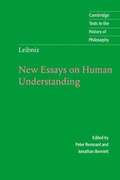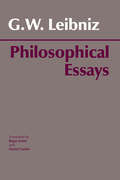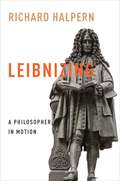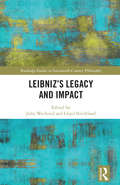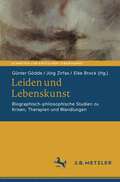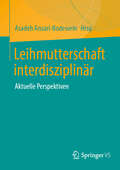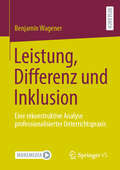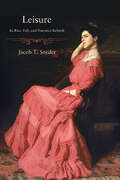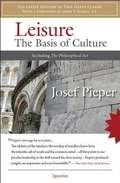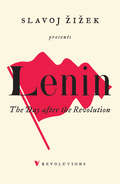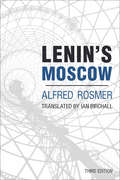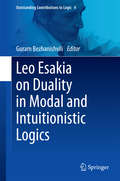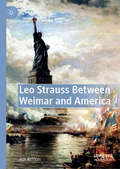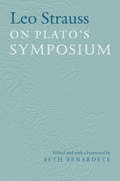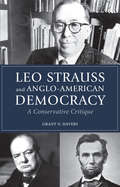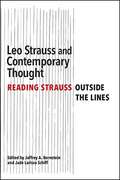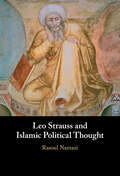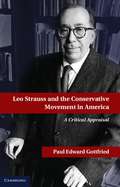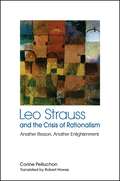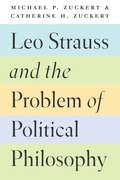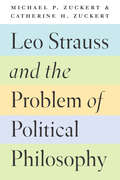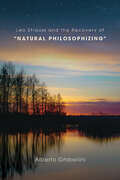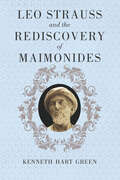- Table View
- List View
Leibniz: New Essays On Human Understanding
by Gottfried Wilhelm Leibniz Jonathan Bennett Peter RemnantChallenging Locke's views in Essays on Human Understanding chapter by chapter, Leibniz's references to his contemporaries and his discussion of the ideas and institutions of the age make this work a fascinating and valuable document in the history of ideas.
Leibniz: Philosophical Essays
by Roger Ariew Gottfried Wilhelm Leibniz Daniel GarberAlthough Leibniz's writing forms an enormous corpus, no single work stands as a canonical expression of his whole philosophy. In addition, the wide range of Leibniz's work--letters, published papers, and fragments on a variety of philosophical, religious, mathematical, and scientific questions over a fifty-year period--heightens the challenge of preparing an edition of his writings in English translation from the French and Latin.
Leibnizing: A Philosopher in Motion (Columbia Themes in Philosophy, Social Criticism, and the Arts)
by Richard HalpernWhy read Leibniz today? Can we still learn from him and not just about him? This book argues that Leibniz offers a powerful, productive model for transdisciplinary thinking that can push back against the narrowness of the humanities today.Richard Halpern recasts Leibniz as a great writer as well as a great philosopher, demonstrating that his philosophical project cannot be fully understood without taking its literary elements into account. He shows Leibniz to be a prescient thinker about art and beauty whose insights into the relationship between aesthetic experience and thought remain invaluable. Leibnizing asks readers to follow the dynamic movement of Leibniz’s writing instead of attempting to grasp a static philosophical system and to pay careful attention to the rhetorical and stylistic registers of Leibniz’s work as well as its conceptual and logical dimensions.For philosophers, this book offers a novel approach to reading and interpreting Leibniz. For literary and other theorists, it showcases the relevance of Leibniz’s thought to areas from aesthetics to politics and from metaphysics to computer science. Written in a lucid and even witty style, Leibnizing provides readers with an accessible entryway into Leibniz’s sometimes forbidding but ultimately rewarding philosophical vision.
Leibniz’s Legacy and Impact (Routledge Studies in Seventeenth-Century Philosophy)
by Lloyd Strickland Julia WeckendThis volume tells the story of the legacy and impact of the great German polymath Gottfried Wilhelm Leibniz (1646-1716). Leibniz made significant contributions to many areas, including philosophy, mathematics, political and social theory, theology, and various sciences. The essays in this volume explores the effects of Leibniz’s profound insights on subsequent generations of thinkers by tracing the ways in which his ideas have been defended and developed in the three centuries since his death. Each of the 11 essays is concerned with Leibniz’s legacy and impact in a particular area, and between them they show not just the depth of Leibniz’s talents but also the extent to which he shaped the various domains to which he contributed, and in some cases continues to shape them today. With essays written by experts such as Nicholas Jolley, Pauline Phemister, and Philip Beeley, this volume is essential reading not just for students of Leibniz but also for those who wish to understand the game-changing impact made by one of history’s true universal geniuses.
Leiden und Lebenskunst: Biographisch-philosophische Studien zu Krisen, Therapien und Wandlungen (Schriften zur Kritischen Lebenskunst)
by Günter Gödde Jörg Zirfas Eike BrockIndividuelle Überlegungen zur Lebenskunst bieten Orientierungen und Strategien im Umgang mit Krisenerfahrungen in prekären Zeiten. Wer Studien zu Krankheiten und Leidenserfahrungen, Therapien und Wandlungen betreibt, der verschränkt mithin die Lebenskunstmodelle mit den Biographien bedeutender Persönlichkeiten und verdeutlicht damit, wie wichtig der biographische Entstehungskontext für die Modelle ist. Den zentralen Gesichtspunkt bildet dabei die explizite oder implizite Innenperspektive auf die Lebenskunst, auf die mit ihr verbundenen Kategorien und Prozesse, Organisationsformen und Institutionalisierungen und damit auf die Wandlungen und Strukturen ihrer Theorien und Praktiken eines gelungenen Lebens, auf die Erzeugung von Sinn und Glück, den Aufbau von Identität und den Umgang mit den anderen und der Welt. Die hier präsentierte Auswahl an bedeutenden Autorinnen und Autoren der Moderne – von Michel de Montaigne bis Martha Nussbaum – belegt, dass der Ausgangspunkt für Überlegungen zur Lebenskunst in ihren körperlichen, psychischen, sozialen oder kulturellen Krisen bzw. „Krankheiten“ oder Leidenserfahrungen besteht, die wiederum spezifische Lebenskünste zur Folge haben.
Leihmutterschaft interdisziplinär: Aktuelle Perspektiven
by Asadeh Ansari-BodeweinDer vorliegende Band enthält eine Sammlung von Aufsätzen zum Thema Leihmutterschaft aus Blickrichtungen verschiedener Disziplinen, die allesamt jeweils an den aktuellen Forschungsstand anknüpfen. Das Buch wendet sich an Interessierte aller Fächer, die sich mit der kontrovers diskutierten Frage nach einer Liberalisierung von Leihmutterschaftsmodellen befassen und gibt dabei einen Einblick in die Grundlagen der Diskussion in den relevanten Fächern Philosophie, Psychologie, Soziologie, Rechtswissenschaft und Medizin.
Leistung, Differenz und Inklusion: Eine rekonstruktive Analyse professionalisierter Unterrichtspraxis
by Benjamin WagenerWährend der Zusammenhang von sozialer Ungleichheit und schulischem Leistungsprinzip durchaus im Fokus empirischer Forschung steht, stellt die Analyse des Herstellungsprozesses von Differenz und Ungleichheit im Vollzug von Unterricht nach wie vor ein Desiderat dar. Der Zugang zur Unterrichtspraxis setzt wiederum ein komplexes methodisches Vorgehen voraus. Anhand von Unterrichtsvideographien rekonstruiert der Autor unterschiedliche Praxen leistungsbezogener Differenzkonstruktionen in Gymnasien und in Sekundarschulen mit einer inklusiven Programmatik. Die empirischen Ergebnisse, die in der Tendenz auf schulform- und fachspezifische Unterschiede verweisen, reflektiert er im Hinblick auf Professionalisierung in praxeologischer Perspektive sowie mit Bezug auf den aktuellen Diskurs um schulische Inklusion.
Leisure: Its Rise, Fall, and Potential Rebirth
by Jacob T. SnyderLeisure is a genealogy of the concept of leisure, from its peak in the classical age to its inversion and fall in modern liberalism. The goal of this genealogy is to analyze models of leisure and to inquire into the potential future shape of it. In that process, Jacob T. Snyder asks: what was leisure in its peak form in the classical age? In such a form, how was leisure understood to be connected to human flourishing? Then, what happened to leisure? What was the argument for work that won over the West? What must be rejected, or lost, about work if leisure is to be reanimated? In asking and answering these questions, Snyder argues that political reform, such as limiting work weeks, is insufficient to make us leisured. Leisure demands more, including a new understanding of what makes us happy and thriving creatures.
Leisure: The Basis of Culture and The Philosophical Act
by Josef Pieper"One of the most important philosophy titles published in the twentieth century, Josef Pieper's Leisure, the Basis of Culture is more significant, even more crucial, today than it was when it first appeared more than fifty years ago. This special new edition now also includes his little work The Philosophical Act. Leisure is an attitude of the mind and a condition of the soul that fosters a capacity to perceive the reality of the world. Pieper shows that the Greeks and medieval Europeans, understood the great value and importance of leisure. He also points out that religion can be born only in leisure - a leisure that allows time for the contemplation of the nature of God. Leisure has been, and always will be, the first foundation of any culture. Pieper maintains that our bourgeois world of total labor has vanquished leisure, and issues a startling warning: Unless we regain the art of silence and insight, the ability for non-activity, unless we substitute true leisure for our hectic amusements, we will destroy our culture - and ourselves. "Pieper's message for us is plain. . . . The idolatry of the machine, the worship of mindless know-how, the infantile cult of youth and the common mind - all this points to our peculiar leadership in the drift toward the slave society. . . . Pieper's profound insights are impressive and even formidable. "- New York Times Book Review "Pieper has subjects involved in everyone's life; he has theses that are so counter to the prevailing trends as to be sensational; and he has a style that is memorably clear and direct. " - Chicago Tribune"
Lenin 2017: Remembering, Repeating, and Working Through
by V. I. Lenin Slavoj ZizekOne hundred years after the Russian Revolution, i ek shows why Lenin’s thought is still important todayLenin’s originality and importance as a revolutionary leader is most often associated with the seizure of power in 1917. But, i ek argues in this new study and collection of original texts, Lenin’s true greatness can be better grasped in the very last couple of years of his political life. Russia had survived foreign invasion, embargo and a terrifying civil war, as well as internal revolts such as at Kronstadt in 1921. But the new state was exhausted, isolated and disorientated in the face of the world revolution that seemed to be receding. New paths had to be sought, almost from scratch, for the Soviet state to survive and imagine some alternative route to the future. With his characteristic brio and provocative insight, i ek suggests that Lenin’s courage as a thinker can be found in his willingness to face this reality of retreat lucidly and frontally.From the Hardcover edition.
Lenin's Moscow
by Alfred Rosmer Ian BirchallWhen Alfred Rosmer arrived in Russia in 1919 it was considered by millions to be the center of world revolution. It was also a society beleaguered by civil war and encircled by hostile powers seeking to snuff out the promise and potential the first successful workers' revolution represented. It was in this context that revolutionaries from across the globe undertook the creation of the Communist International, hoping to forge an instrument to fan the flames of the struggle against global capitalism.In this gripping political memoir of his time in Moscow, Rosmer draws on his unique perspective as both a delegate to the Comintern-and as a member of its Executive Committee-to paint a stunning and inspiring picture of the early years of Soviet rule. From the debates sparked by the publication of Lenin's State and Revolution and Left-Wing Communism to the efforts of the International to extend its influence beyond Europe with the Congress of the Peoples of the East in Baku, Rosmer documents key developments with an unparalleled clarity of vision and offers invaluable insights.
Leo Esakia on Duality in Modal and Intuitionistic Logics
by Guram BezhanishviliThis volume is dedicated to Leo Esakia's contributions to the theory of modal and intuitionistic systems. Consisting of 10 chapters, written by leading experts, this volume discusses Esakia's original contributions and consequent developments that have helped to shape duality theory for modal and intuitionistic logics and to utilize it to obtain some major results in the area. Beginning with a chapter which explores Esakia duality for S4-algebras, the volume goes on to explore Esakia duality for Heyting algebras and its generalizations to weak Heyting algebras and implicative semilattices. The book also dives into the Blok-Esakia theorem and provides an outline of the intuitionistic modal logic KM which is closely related to the Gödel-Löb provability logic GL. One chapter scrutinizes Esakia's work interpreting modal diamond as the derivative of a topological space within the setting of point-free topology. The final chapter in the volume is dedicated to the derivational semantics of modal logic and other related issues.
Leo Strauss
by Robert HowseExamines the German and Jewish sources of Strauss's thought and the extent to which his philosophy can shed light on the crisis of liberal democracy.
Leo Strauss Between Weimar and America
by Adi ArmonThis is the first book-length examination of the impact Leo Strauss’ immigration to the United States had on this thinking. Adi Armon weaves together a close reading of unpublished seminars Strauss taught at the University of Chicago in the 1950s and 1960s with an interpretation of his later works, all of which were of course written against the backdrop of the Cold War. First, the book describes the intellectual environment that shaped the young Strauss’ worldview in the Weimar Republic, tracing those aspects of his thought that changed and others that remained consistent up until his immigration to America. Armon then goes on to explore the centrality of Karl Marx to Strauss’s intellectual biography. By analyzing an unpublished seminar Strauss taught with Joseph Cropsey at the University of Chicago in 1960, Armon shows how Strauss’ fragmentary, partial engagement with Marx in writing obscured the important role that Marxism actually played as an intellectual challenge to his later political thinking. Finally, the book explores the manifestations of Straussian doctrine in postwar America through reading Strauss’ The City and Man (1964) as a representative of his political teaching.
Leo Strauss On Plato's Symposium
by Leo Strauss Seth BenardeteThe first major piece of unpublished work by Leo Strauss to appear in more than thirty years, this volume offers the public the unprecedented experience of encountering this renowned scholar as his students did. Given as a course in autumn 1959 under the title "Plato's Political Philosophy," these provocative lectures-until now, never published, but instead passed down from one generation of students to the next-show Strauss at his subtle and insightful best.
Leo Strauss and Anglo-American Democracy: A Conservative Critique
by Grant HaversIn this original new study, Grant Havers critically interprets Leo Strauss's political philosophy from a conservative perspective. Most mainstream readers of Strauss have either condemned him from the Left as an extreme right-wing opponent of liberal democracy or celebrated him from the Right as a traditional defender of Western civilization. Rejecting both of these portrayals, Havers shifts the debate beyond the conventional parameters of our age. He persuasively shows that Strauss was neither a man of the Far Right nor a conservative. He was in fact a secular Cold War liberal who taught his followers to uphold Anglo-American democracy as the one true universal regime that does not need a specifically Christian foundation. Strauss firmly rejects the traditional conservative view held by Edmund Burke that Anglo-American democracy needs the leavening influence of Christian morality (love thy neighbor). Havers maintains that Strauss's refusal to recognize the role of Christianity in shaping Western civilization, though historically unjustified, is crucial to Strauss and the Straussian portrayal of Anglo-American democracy. In the Straussian view, the Anglo-American ideals of liberty, equality, and constitutional government owe more to the ancient Greek philosophers Plato and Aristotle than to the Christian tradition. In the process, Havers argues, Straussians end up rewriting history by falsely idealizing the ancient Greeks as the forerunners of modern liberal democracy, despite the Greek toleration of practices such as slavery and infanticide. Straussians also misrepresent statesmen of the Anglo-American political tradition such as Abraham Lincoln and Sir Winston Churchill as heirs to the ancient Greek tradition of statecraft, despite their indebtedness to Christianity. Havers contends that the most troubling implication of Straussianism is that it provides an ideological rationale for the aggressive spread of democratic values on a global basis while ignoring the preconditions that make these values possible. Concepts such as the rule of law, constitutional government, Christian morality, and the separation of church and state are not easily transplanted beyond the historic confines of Anglo-American civilization, as recent wars to spread democracy in the Middle East and Central Asia have demonstrated. This excellent study will be of interest not only to longtime readers of Strauss but also philosophers, political scientists, historians, religious studies scholars, and theologians.
Leo Strauss and Contemporary Thought: Reading Strauss Outside the Lines (SUNY series in the Thought and Legacy of Leo Strauss)
by Jeffrey A. Bernstein; Jade L. SchiffLeo Strauss's readings of historical figures in the philosophical tradition have been justly well explored; however, his relation to contemporary thinkers has not enjoyed the same coverage. In Leo Strauss and Contemporary Thought, an international group of scholars examines the possible conversations between Strauss and figures such as Walter Benjamin, Jacques Derrida, Michel Foucault, Charles Taylor, and Hans Blumenberg. The contributors examine topics including religious liberty, the political function of comedy, law, and the relation between the Ancients and the Moderns, and bring Strauss into many new and original discussions that will be of use to those interested in the thought of Strauss, the history of philosophy and political theory, and contemporary continental thought.
Leo Strauss and Islamic Political Thought
by Rasoul NamaziIn this book, Rasoul Namazi offers the first in-depth study of Leo Strauss' writings on Islamic political thought, a topic that interested Strauss over the course of his career. Namazi's volume focuses on several important studies by Strauss on Islamic thought. He critically analyzes Strauss's notes on Averroes' commentary on Plato's Republic and also proposes an interpretation of Strauss' theologico-political notes on the Arabian Nights. Namazi also interprets Strauss' essay on Alfarabi's enigmatic treatise, The Philosophy of Plato and provides a detailed commentary on his complex essay devoted to Alfarabi's summary of Plato's Laws. Based on previously unpublished material from Strauss' papers, Namazi's volume provides new insights into Strauss' reflections on religion, philosophy, and politics, and their relationship to wisdom, persecution, divine law, and unbelief in the works of key Muslim thinkers. His work presents Strauss as one of the most innovative historians and scholars of Islamic thought of all time.
Leo Strauss and The Theologico-Political Problem
by Heinrich MeierThis book, by one of the most prominent interpreters of Leo Strauss's thought, was the first to address the problem that Leo Strauss himself said was the theme of his studies: the theologico-political problem or the confrontation with the theological and the political alternative to philosophy as a way of life. In his theologico-political treatise, which comprises four parts and an appendix, Heinrich Meier clarifies the distinction between political theology and political philosophy and reappraises the unifying center of Strauss's philosophical enterprise. The book is the culmination of Meier's work on the theologico-political problem. It will interest anyone who seeks to understand both the problem caused by revelation for philosophy and the challenge posed by political-religious radicalism. The appendix makes available for the first time two lectures by Strauss that are immediately relevant to the subject of this book and that will open the way for future research and debate on the legacy of Strauss.
Leo Strauss and the Conservative Movement in America
by Paul E. GottfriedThis book offers an original interpretation of the achievement of Leo Strauss, stressing how his ideas and followers reshaped the American conservative movement. The conservative movement that reached out to Strauss and his legacy was extremely fluid and lacked a self-confident leadership. Conservative activists and journalists felt a desperate need for academic acceptability, which they thought Strauss and his disciples would furnish. They also became deeply concerned with the problem of 'value relativism', which self-described conservatives thought Strauss had effectively addressed. But until recently, neither Strauss nor his disciples have considered themselves to be 'conservatives'. Contrary to another misconception, Straussians have never wished to convert Americans to ancient political ideals and practices, except in a very selective rhetorical fashion. Strauss and his disciples have been avid champions of American modernity, and 'timeless' values as interpreted by Strauss and his followers often look starkly contemporary.
Leo Strauss and the Crisis of Rationalism: Another Reason, Another Enlightenment (SUNY series in the Thought and Legacy of Leo Strauss)
by Corine PelluchonHow can Leo Strauss's critique of modernity and his return to tradition, especially Maimonides, help us to save democracy from its inner dangers? In this book, Corine Pelluchon examines Strauss's provocative claim that the conception of man and reason in the thought of the Enlightenment is self-destructive and leads to a new tyranny. Writing in a direct and lucid style, Pelluchon avoids the polemics that have characterized recent debates concerning the links between Strauss and neoconservatives, particularly concerns over Strauss's relation to the extreme right in Germany. Instead she aims to demystify the origins of Strauss's thought and present his relationship to German and Jewish thought in the early twentieth century in a manner accessible not just to the small circles devoted to the study of Strauss, but to a larger public. Strauss's critique of modernity is, she argues, constructive; he neither condemns modernity as a whole nor does he desire a retreat back to the Ancients, where slaves existed and women were not considered citizens. The question is to know whether we can learn something from the Ancients and from Maimonides—and not merely about them.
Leo Strauss and the Problem of Political Philosophy
by Catherine H. Zuckert Michael P. ZuckertLeo Strauss and his alleged political influence regarding the Iraq War have in recent years been the subject of significant media attention, including stories in the Wall Street Journal and New York Times. Time magazine even called him "one of the most influential men in American politics. ” With The Truth about Leo Strauss, Michael and Catherine Zuckert challenged the many claims and speculations about this notoriously complex thinker. Now, with Leo Strauss and the Problem of Political Philosophy, they turn their attention to a searching and more comprehensive interpretation of Strauss’s thought as a whole, using the many manifestations of the "problem of political philosophy” as their touchstone. For Strauss, political philosophy presented a "problem” to which there have been a variety of solutions proposed over the course of Western history. Strauss’s work, they show, revolved around recovering--and restoring--political philosophy to its original Socratic form. Since positivism and historicism represented two intellectual currents that undermined the possibility of a Socratic political philosophy, the first part of the book is devoted to Strauss’s critique of these two positions. Then, the authors explore Strauss’s interpretation of the history of philosophy and both ancient and modern canonical political philosophers, including Plato, Aristotle, Machiavelli, and Locke. Strauss’s often-unconventional readings of these philosophers, they argue, pointed to solutions to the problem of political philosophy. Finally, the authors examine Strauss’s thought in the context of the twentieth century, when his chief interlocutors were Schmitt, Husserl, Heidegger, and Nietzsche. The most penetrating and capacious treatment of the political philosophy of this complex and often misunderstood thinker, from his early years to his last works, Leo Strauss and the Problem of Political Philosophy reveals Strauss’s writings as an attempt to show that the distinctive characteristics of ancient and modern thought derive from different modes of solving the problem of political philosophy and reveal why he considered the ancient solution both philosophically and politically superior.
Leo Strauss and the Problem of Political Philosophy
by Catherine H. Zuckert Michael P. ZuckertLeo Strauss and his alleged political influence regarding the Iraq War have in recent years been the subject of significant media attention, including stories in the Wall Street Journal and New York Times.Time magazine even called him “one of the most influential men in American politics.” With The Truth about Leo Strauss, Michael and Catherine Zuckert challenged the many claims and speculations about this notoriously complex thinker. Now, with Leo Strauss and the Problem of Political Philosophy, they turn their attention to a searching and more comprehensive interpretation of Strauss’s thought as a whole, using the many manifestations of the “problem of political philosophy” as their touchstone. For Strauss, political philosophy presented a “problem” to which there have been a variety of solutions proposed over the course of Western history. Strauss’s work, they show, revolved around recovering—and restoring—political philosophy to its original Socratic form. Since positivism and historicism represented two intellectual currents that undermined the possibility of a Socratic political philosophy, the first part of the book is devoted to Strauss’s critique of these two positions. Then, the authors explore Strauss’s interpretation of the history of philosophy and both ancient and modern canonical political philosophers, including Plato, Aristotle, Machiavelli, and Locke. Strauss’s often-unconventional readings of these philosophers, they argue, pointed to solutions to the problem of political philosophy. Finally, the authors examine Strauss’s thought in the context of the twentieth century, when his chief interlocutors were Schmitt, Husserl, Heidegger, and Nietzsche. The most penetrating and capacious treatment of the political philosophy of this complex and often misunderstood thinker, from his early years to his last works, Leo Strauss and the Problem of Political Philosophy reveals Strauss’s writings as an attempt to show that the distinctive characteristics of ancient and modern thought derive from different modes of solving the problem of political philosophy and reveal why he considered the ancient solution both philosophically and politically superior.
Leo Strauss and the Recovery of "Natural Philosophizing" (SUNY series in the Thought and Legacy of Leo Strauss)
by Alberto Marco GhibelliniAmong the political philosophers of the twentieth century, Leo Strauss is usually singled out for his attempt to revitalize the ancient approach to counter the relativism of both historicism and positivism. It is less commonly underscored, however, that the cornerstone of this attempt is the recovery of the question of "nature," which he regarded as inseparable from genuine philosophy since its inception in ancient Greece. Leo Strauss and the Recovery of "Natural Philosophizing" addresses such a theme, focusing on the theoretical presuppositions that Strauss found at the basis of the acquired inability to raise the question of nature. Prominent among these is the encounter between philosophy and revelation, which, due to their conceptual incompatibility, leads to a condition Strauss metaphorically described as a "second, 'unnatural' cave" characterized by insurmountable "prejudices" rather than "appearance and opinion." These, however, are the starting point of genuine philosophy in the Platonic "first, 'natural' cave," which has to be regained, by way of historical deconstruction of the presuppositions of the second cave, if the "natural philosophizing" embodied by Socratic dialectics is to be reactivated.
Leo Strauss and the Rediscovery of Maimonides
by Kenneth Hart GreenIn Leo Strauss and the Rediscovery of Maimonides, Kenneth Hart Green explores the critical role played by Maimonides in shaping Leo Strauss’s thought. In uncovering the esoteric tradition employed in Maimonides’s Guide of the Perplexed, Strauss made the radical realization that other ancient and medieval philosophers might be concealing their true thoughts through literary artifice. Maimonides and al-Farabi, he saw, allowed their message to be altered by dogmatic considerations only to the extent required by moral and political imperatives and were in fact avid advocates for enlightenment. Strauss also revealed Maimonides’s potential relevance to contemporary concerns, especially his paradoxical conviction that one must confront the conflict between reason and revelation rather than resolve it. An invaluable companion to Green’s comprehensive collection of Strauss’s writings on Maimonides, this volume shows how Strauss confronted the commonly accepted approaches to the medieval philosopher, resulting in both a new understanding of Maimonides and a new depth and direction for his own thought. It will be welcomed by anyone engaged with the work of either philosopher.
